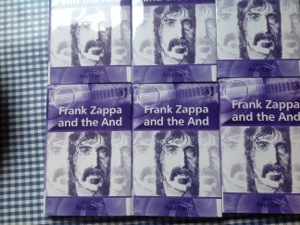Well, after the best part of eight years of trying to understand what makes his music tick – I completed what will be my final piece of work on Zappa for a while. Close on the heels of Frank Zappa and the And – I have recently completed a chapter for a forthcoming book on music and virtuality. It uses Zappa’s philosophies and compositional techniques as the basis for trying to understand the ways in which music can be considered ‘virtual’. Drawing on the thoughts of the likes of Kant, Hagal, Schopenhauer, Nietzsche and Bernard Russell, the chapter tries to present ways in which we, as listeners interface with the system of signs and sonic vibrations we call ‘music’.
In the couple of months since its release, the reception to Frank Zappa and the And is building nicely – having good recent reviews in both Record Collector and Pop Matters. It has also had some local press – and a forthcoming interview on the BBC in a couple of weeks. Having said this, considering we are approaching the 20th anniversary of his death – I am surprised that there is not more media exposure of his music this year. Why is his music still on the ‘outside’ still? I would welcome the opportunity to discuss this in any forums etc that anyone is aware of.
I am sorry for the delay between this post and the last one – but I now intend to once again begin blogging more regularly. For the moment – I have copied the abstract of the new chapter below. A Facebook site for Frank Zappa and the And can be found here and a Vine presentation here
This essay will discuss the creation and reception of the music of Frank Zappa, who overtly positioned his creative output in a virtual, often teleological dimension. Through the analysis of Zappa’s music and personal philosophies such as Xenochrony, Project/Object and Big Note, the essay will draw on the work of a range of scholars from Hanslick, Hagel, Nietzsche and Schopenhauer, to Bernard Russell, Jennifer Robertson and Leo Treitler, ultimately examining the broader question regarding the extent to which music (often with the assistance of written language and lyrics) has the capacity to be representational and/or ‘virtual’. Due to Zappa’s obsession with recording his live concerts, the essay will also place his music in the context of philosophies such as Perdurantism, Organism and metaphysics, asking the important question where the ontological presence of his songs exist.



